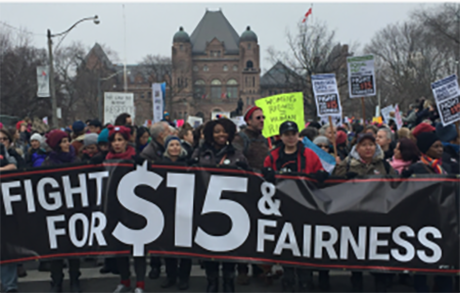Features
You are here
Beyond Bill 148: to beat the Big Business lobby we need to make the Fight $15 and Fairness an election issue

September 11, 2017
Since Bill 148, the Fair Wages, Better Workplaces Act, was first announced in May, there has been an intense ideological battle underway as the Big Business lobby attempts to re-assert the narrative that improvements in workers’ wages and working conditions will harm the economy and result in job losses.
Bill 148 is the result of years of mobilizing by community and labour organizations, calling on the government to increase the minimum wage, change labour laws, and improve employment standards to better protect – and empower – workers. That the government has moved substantially on so many of these issues speaks as much to the power of a united working-class movement as it does to a weakened government fighting for its own survival in an election just nine months away. And in this political moment, it is crucially important to see both sides of this picture.
The balance of class forces is not strong enough yet to guarantee a positive outcome for workers now or after the next election. It is urgent that we organize and mobilize to protect the gains made in Bill 148 and continue to fight for more, in legislation and in our collective agreements.
Bill 148: Round one
In mid-August, the Ontario Chamber of Commerce rushed to release its “findings” of a so-called “economic impact” report prepared by CanCEA (Canadian Centre for Economic Analysis). They were rushing because they knew the legislative committee would be considering amendments to Bill 148 and they planned on flooding the mainstream media with doomsday scenarios to scare politicians and the public away from workers’ demands while building support for concessions to Big Business.
Fortunately, the labour-community supports built up through the Fight for $15 and Fairness were poised and ready. Shortly after the Chamber tabled the CanCEA PowerPoint deck making outrageous claims of costs, household expenses, and job losses associated with Bill 148, economists on the left and right of the political spectrum offered significant criticism of the report, from methodological mysteries to math missteps. Although these critiques did not garner the same headlines as the original report, they did force CanCEA to withdraw at least one figure, and put the Chamber of Commerce on the back foot.
Thousands of workers shared these critiques on social media and dozens of letters have been sent to newspapers in communities across Ontario, challenging the narrative peddled by the Ontario Chamber of Commerce. These interventions help chip away at the dominant ideology and builds workers’ confidence to push forward their own agenda.
On August 21, Bill 148 emerged from the first round of the amendment process with two setbacks alongside some modest improvements. The first setback consists of amendments to the scheduling provisions of Bill 148 that will give employers loopholes to avoid the fairer scheduling provisions under the law. The second setback consists of an amendment to the equal pay provisions of the bill that define seniority as including the number of hours worked, not the date of hire. This provision will entrench inequality between full-time and part-time workers and defeats the intent of equal pay. And it could undermine collective agreements where seniority is based on the date of hire, not the number of hours worked.
Amendments put forward by the NDP to eliminate the sub-minimum wage rates for students under the age of 18 and liquor servers were defeated, as were amendments that would have increased paid vacation and emergency leaves for workers.
However, an NDP amendment calling for a separate, unpaid leave for workers who self-identify as victims of sexual violence or domestic abuse was adopted by all parties.
Unfortunately, there was no movement to strengthen the language provided in Bill 148 to ensure equal pay for part-time and full-time workers, and for temporary agency workers. Strong language on this issue is crucial for addressing the gender wage gap because women are by far the greatest proportion of part-time workers – a consequence of their still shouldering the bulk of family care-giving. Strong language would also be a body blow to the temporary staffing industry that contributes to precarious employment and undermines unions’ ability to organize.
Bill 148: Round two
Bill 148 must now be tabled in the Ontario Legislative Assembly for 2nd Reading (consideration) after which parliamentary procedure dictates it must go to Committee for (further) consultation and amendment. While this additional round of consultations creates another platform for the Big Business lobby to advance its agenda, it also gives workers another chance to mobilize to improve the equal pay language and stop the previously noted concessions.
The Legislature reconvenes on Monday, September 11 and we don’t know the precise day Bill 148 will be tabled; nor do we know when, or for how long, it will be considered by the Standing Committee on Finance and Economic Affairs.
What we do know is that the Big Business lobby is pushing back hard. Any day now, we expect a much slicker, multi-million-dollar campaign to be launched against Bill 148. And regardless of whether this campaign succeeds in de-railing Bill 148 in the short-term, the ruling class will have its eyes set on the next election. They will want to ensure that pro-business candidates are elected everywhere to rollback and offset any legislative gains extracted by working people. Any hiccup in the economy, every layoff, and any small business closure will be used to “prove” to workers that Bill 148 – and by extension the Fight for $15 and Fairness – was misguided and that workers are losing more than they are gaining.
Bill 148 and Collective Bargaining
For unionized workers, there’s a lot at stake.
Not only would Bill 148 extend card-based union certification to more workers, the bill also introduces other important measures to make it easier for workers to organize unions.
Equally important to collective bargaining are the improved minimum standards included in the Employment Standards Act. When legislation raises the floor of wages and working conditions, it forms the foundation of collective agreements, allowing unions to set the bar even higher. By the same token, erosions in the wage floor make it harder for unions to protect what they have and harder still to win improvements.
Bill 148 will provide significant improvements to collective agreements – especially in precarious sectors where, due to lack of union density, it has been hard to raise the floor of wages and benefits. For example, almost 10% of Ontario workers earning less than $15 an hour are unionized. Bill 148 would raise wages for all those employees as soon as the respective provisions of the Bill come into effect. Collective agreements with differentials between full-time and part-time workers will now have to be rectified by 2020 – a year after the equal pay provisions come into effect for non-union workers. Similarly, the fairer scheduling provisions outlined in Bill 148 (scheduled to take effect in 2019) must be reflected in collective agreements by 2020. It would be wise for unions currently at the bargaining table to address these changes as quickly as possible.
Also of tremendous importance: Bill 148 would extend most ESA provisions to crown employees (those who work for Crown corporations or other government agencies). Considering the flashpoints in the most recent rounds of bargaining for LCBO workers and OLG (Ontario Lottery and Gaming Corporation) around on-call work and scheduling, Bill 148 offers significant gains for these workers and their unions.
But we must also understand that these gains have not gone un-noticed by employers. We must assume that the far-sighted ones are preparing for concessionary bargaining, either now or in the next round of bargaining. We need only look at belligerent actions of Swissport International toward its workers to get a glimpse of what may be coming at us. There’s no time to lose. Unions with members most likely to benefit from Bill 148 need to prepare now to build a fighting, engaged membership and, crucially, to build solidarity with broader working-class forces that will be necessary to beat Big Business where it really hurts: on the shop floor.
For all these reasons, the Fight for $15 and Fairness must not only continue, it must expand – in the streets, on campuses and in our workplaces. Even if it is adopted, Bill 148 will not fully take effect until 2019 and, for unionized workers, perhaps not until 2020. Between now and then stands a provincial election, the outcome of which really matters. The last time substantial progressive legislation was adopted, the incoming Conservative government dismantled it and rolled back the clock on workers’ legal rights. This time, we must stay mobilized to defeat the Big Business lobby, build on our accomplishments and ensure that whatever party wins the next election, they dare not undermine our progress – but feel the heat to deliver more.
Join the Ontario $15 and Fairness Campus Assembly, September 15-16 at UofT
Section:










